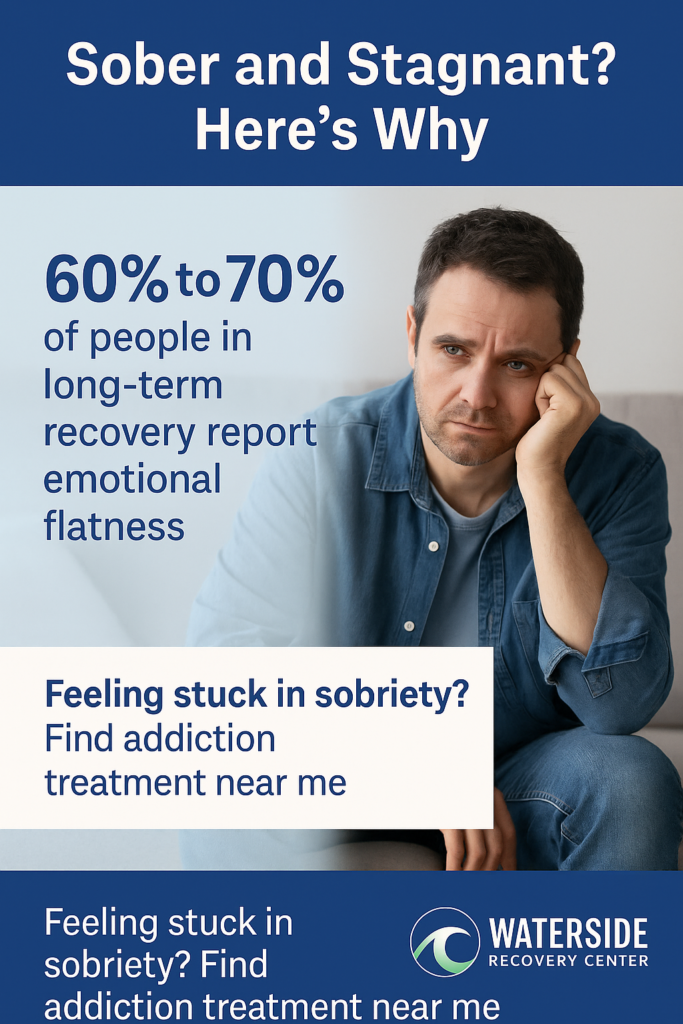You’ve put in the work. You’re sober. But something still feels off. You’re going through the motions, and while the chaos is gone, so is the spark. You’re not using—but you’re not thriving either.
This emotional flatness isn’t failure. It’s common. And more importantly, it’s addressable. At Waterside Recovery, we work with many long-term sober clients who reach a point where they ask: Now what? If you’re searching for addiction treatment near me in Plymouth or Bristol Counties to help reignite connection and meaning, you’re not alone—and you’re not starting over.
When Sobriety Stops Feeling Like Progress
Getting sober is a massive achievement. But the emotional journey doesn’t stop there. In fact, many people in long-term recovery experience a “plateau”—a period where progress feels stalled.
This might look like:
- Feeling emotionally numb or disconnected
- Losing motivation or sense of purpose
- Struggling to connect with others—even sober peers
- Questioning your identity post-addiction
These experiences don’t mean something’s wrong with you. They mean you’re human. And you’ve likely hit a point where emotional recovery needs more attention.
“I wasn’t using. I was doing everything right. But inside, I felt like a ghost. That’s when I knew I needed more than just abstinence—I needed to reconnect with myself.”
— Outpatient Client, 2023
Sobriety Isn’t the Same as Wholeness
Staying substance-free is a critical foundation, but true recovery also means rebuilding relationships—with others, and with yourself. Emotional healing often lags behind physical abstinence, especially when trauma, grief, or identity loss are involved.
Many clients we work with in Plymouth and Bristol Counties come to us not because they’re using again—but because they’re not okay. And that’s enough of a reason to seek support.
At Waterside Recovery, our clinicians help clients explore deeper emotional work through:
- Individual therapy focused on identity, purpose, and connection
- Trauma-informed approaches for unresolved pain
- Group support for honest, judgment-free community
When someone feels stuck, we often explore the underlying dynamics contributing to their emotional stagnation. Have they experienced unresolved loss? Are they carrying expectations that no longer fit who they’re becoming? These are questions worth unpacking—and not alone.
You Don’t Have to Hit Bottom to Ask for Help
There’s a harmful myth that you need to relapse, spiral, or “fall apart” before seeking more support. But recovery isn’t a one-time fix—it’s an evolving relationship with yourself.
Just like we go to the doctor for checkups, you can return to treatment simply because you want to feel more like yourself. No crisis required.
Whether you’re seeking additional clarity, emotional depth, or renewed direction, your recovery deserves attention even when you’re technically “doing okay.”
If you’re searching for addiction treatment near me to help you feel more alive, more clear, or more present, you don’t need to justify that with crisis. You just need the willingness to explore what might help.
Whether you’re in Plymouth, New Bedford, Fall River, or anywhere nearby, we’re here to help you take the next step—not backward, but deeper.

Recovery Shouldn’t Feel Like Emptiness
Healing is supposed to help you feel more—not less. But emotional flatness in sobriety can feel like something’s missing. If your days feel too quiet, your relationships feel shallow, or your sense of self feels out of reach, treatment can help.
We’ve supported alumni who:
- Returned for therapy after a year sober to work on identity
- Realized they needed trauma treatment, not just sobriety tools
- Found meaning again through group support and peer connection
Sometimes, the most powerful breakthroughs happen not at rock bottom—but in those quiet, questioning moments when we admit we want more. More meaning. More connection. More joy.
“It wasn’t about staying sober anymore—it was about feeling whole again. Waterside gave me space to do that.”
— Client, Plymouth County
What People Say
“I didn’t relapse. I just felt lost. This helped me find direction again.”
“There was no judgment—just help.”
“I thought treatment was only for the beginning. Turns out, it’s here for the middle, too.”
FAQ: Emotional Flatness in Long-Term Sobriety
Is it normal to feel emotionally flat after being sober for a while?
Yes. Many people experience a “gray zone” after the initial relief of sobriety fades. It’s normal to feel stuck or disconnected—and treatable.
Do I need to relapse before seeking treatment again?
Not at all. Support isn’t just for relapse—it’s for reconnection, healing, and growth. If you feel flat, therapy can help.
How can addiction treatment help if I’m already sober?
Treatment isn’t just about stopping substances. It’s also about emotional health, self-understanding, and deeper healing. Many of our clients are sober and still benefit greatly.
Can I get help locally in Plymouth or Bristol County?
Yes. Waterside Recovery offers compassionate, local care that meets you where you are—whether you’re in Fall River, New Bedford, or nearby towns.
What kind of support is available for alumni?
We offer continued outpatient therapy, alumni groups, and trauma-informed counseling tailored to your stage of recovery.
Ready to Reconnect?
If you’re sober but stuck, we see you. And we know this phase doesn’t mean failure—it means it’s time for deeper care. Our team at Waterside Recovery is here to walk with you, not talk at you.
Ready to talk it through? Call us at (866)671-8620. We’re here to help you feel more connected, more grounded, and more like yourself.


